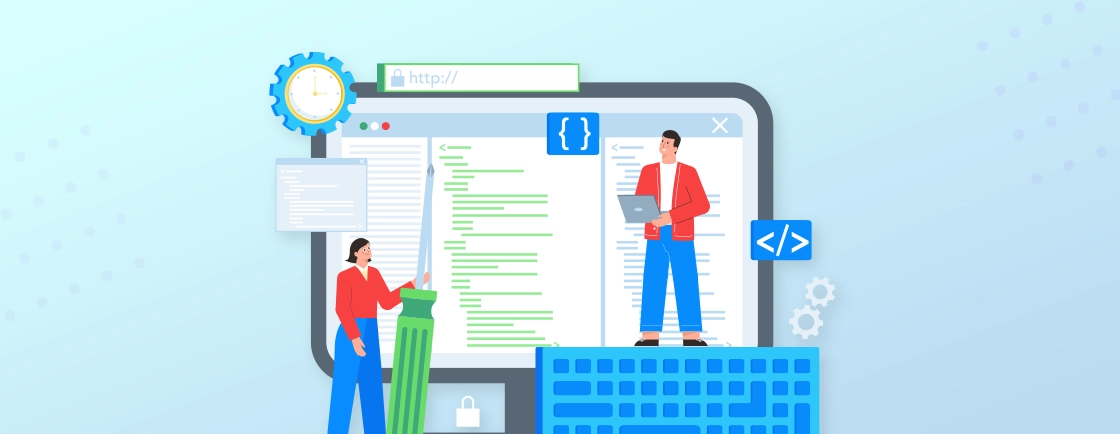Table of Contents
Looking to create the best websites? Or maybe want the best web applications. Then you would need help from highly-skilled web developers. From the visually appealing layouts to the smooth functionality you experience, web developers play a crucial role in shaping your online experience.
But the world of web development isn’t a one-size-fits-all situation. Depending on the complexity of your project, you might need to hire a specialist or a well-rounded pro. To that end, there are three main types of web developers: front-end, back-end, and full-stack.
So, in this blog, we will discuss these types of developers in detail. Let’s begin.
Who is a Web Developer?
A web developer is the one who specializes in creating and maintaining websites. They develop websites using various web frameworks, programming languages, and web technologies. The key programming languages they use are HTML, CSS, and JavaScript. Plus, they use server-side languages like PHP, Python, or Ruby.
Web developers are responsible for creating visually appealing websites with robust backends. They can build various types of websites ranging from blog sites to eCommerce stores. But have you wondered what skills make them capable of building websites? Let’s check on the key skills they possess to get your answer.
Key Skills of Web Developers
Web development includes two key aspects: frontend and backend development. These two aspects need different sets of skills, but there are some key skills all developers possess.
Let’s have a look.
- Web Technologies: Web developers have the skill to work with the best web technologies. They can effectively build websites using various frameworks, libraries, and web development tools.
- Problem-solving and Critical Thinking: Developers are problem solvers. They can deal with complex development issues and fix them. The problem could range from handling high traffic to various integrations.
- Programming Languages: They have knowledge of foundational programming languages like HTML, JavaScript, and PHP. The specific languages they know can depend on what they are working on and their specialization.
- Database Management: Developers can use query languages like SQL and NoSQL to manage databases. Handling data is one of the key aspects of building dynamic websites.
- Content Management Systems (CMS): By using the best CMS platforms like WordPress or Drupal, they can build websites effectively. It lets them manage content on the website in a better way.
- APIs and Integrations: To enhance the functionality of websites, API integration is used. It makes the site more dynamic and robust with live data and other benefits.
- DevOps: They also use DevOps in web development to automate processes for efficiency. It helps them save operational time and focus on optimizing website performance.
- Version Control Systems: By using version control systems like Git, they can collaborate more effectively. It also lets them revert their code to the previous version and much more.
These skills are the reason behind a beautiful and robust website you see on the browser. If you want to leverage their ability, hire web developers to build dynamic sites. To know about web developers, let’s dive into their types.
Different Types of Web Developers
There are different types of web developers based on the aspect of development they are working on. Overall, there are three types of developers: frontend, backend, and full-stack developers. Each type plays a critical role in building and maintaining websites with their unique set of skills and expertise.
Frontend developers create the user interface, and backend developers build the backend of a website. Full-stack developers can work on both the front end and the back end. But, now let’s have a detailed overview of each with their respective skills.
1. Frontend Developers
Frontend developers build the visual and interactive aspects of a website. They work on the client side, focusing on what users see and interact with directly. Their role involves translating design mockups into functional, responsive websites.
Front-end developers collaborate closely with web designers to implement the visual aspects of a site. They use languages like HTML CSS and frameworks like Bootstrap and Angular for efficient and optimized development.
Key Skills of Frontend Developers
- HTML (HyperText Markup Language): HTML forms the backbone of web pages, providing the basic structure and content. A front-end developer must master HTML to create well-structured, semantic web pages.
- CSS (Cascading Style Sheets): CSS is essential for styling web pages. A proficient front-end developer uses CSS to create visually appealing, responsive designs. They can use layout techniques like Flexbox and CSS Grid, along with preprocessors like Sass, to write efficient code.
- JavaScript: JavaScript language is crucial for adding interactivity to web pages. Front-end developers must understand core concepts such as variables, functions, and DOM manipulation. JavaScript frameworks like React and Angular enable developers to build dynamic interfaces with enhanced functionality.
- Responsive Design: The responsive design ensures the website works seamlessly across different devices and screen sizes. This skill ensures that content adjusts smoothly, providing an optimal user experience on desktops, tablets, and smartphones.
- Frameworks and Libraries: Familiarity with frameworks and libraries like React, Vue.js, and Bootstrap accelerates development. These tools provide pre-designed components, enabling developers to create complex web designs quickly.
- Version Control: Front-end developers use Git to track changes, manage branches, and collaborate with team members. Understanding Gitflow ensures smooth development workflows and efficient handling of feature development, releases, and bug fixes.
- Performance Optimization: Front-end developers reduce file sizes through code minification, compress images, and implement lazy loading. Caching strategies further enhance load times, providing users with a smooth, efficient browsing experience.
- UI/UX Design Principles: They create user-centric designs that focus on accessibility and usability. Proficiency in design tools like Figma helps developers prototype and implement intuitive, visually appealing interfaces.
- Testing and Debugging: Frontend developers write unit tests with frameworks like Jest. They also perform end-to-end testing using Selenium and browser developer tools to troubleshoot and resolve issues. It lets them ensure high-quality, bug-free code.
2. Backend Developers
Backend developers focus on the server side of web development. They are responsible for making the site functional and dynamic. Using backend technologies, developers ensure that the server, database, and application communicate with each other seamlessly.
They also work on creating algorithms, website optimization, and databases. The language they use depends on the technology they are working on. Some commonly used server-side languages for backend development include Python, Java, and PHP.
Key Skills of Backend Developers
- Server-Side Languages: Mastery of server-side programming languages like Python, Java, Ruby, PHP, or Node.js is essential. Backend developers write business logic, handle server requests, and process data. These languages enable the creation of dynamic, efficient, and secure server-side applications.
- Server, Network, and Hosting Environments: Understanding server management, network protocols, and hosting environments is essential. Backend developers ensure servers are configured correctly. They handle load balancing and manage server resources efficiently to provide a scalable environment for websites.
- Databases: Proficiency in database management systems like MySQL, PostgreSQL, or MongoDB is crucial. Backend developers design database schemas, write queries, and handle data storage. This skill ensures efficient, secure, and reliable data management for applications.
- APIs: Backend developers create and maintain APIs to bridge the server and client-side applications. They design RESTful services, ensuring robust and efficient data exchange. These APIs enable seamless integration with front-end and third-party services.
- Web Servers: Knowledge of web servers like Apache, Nginx, or IIS is important. They configure web servers and ensure secure communication. This skill ensures that web applications are delivered efficiently and securely to users.
- Version Control: Backend developers use Git to track changes, manage branches, and collaborate with team members. Understanding branching strategies like Gitflow ensures efficient handling of feature development, releases, and bug fixes.
- Scalability and Performance Optimization: Optimizing backend performance and ensuring scalability are key responsibilities. Backend developers design systems that handle increased loads by implementing caching and optimizing queries. This skill ensures that applications remain responsive and perform under high traffic.
- Security: Protecting user data and preventing website vulnerabilities is crucial. Back-end developers should follow important web security practices to safeguard against attacks like SQL injection or cross-site scripting.
- DevOps and Continuous Integration/Continuous Deployment (CI/CD): Backend developers automate deployment processes, manage infrastructure as code, and ensure CI/CD. This skill enhances development efficiency and ensures smooth, automated deployments.
- Cloud Services: Proficiency in cloud services like AWS, Azure, or Google Cloud is valuable. Backend developers leverage cloud platforms for scalable infrastructure, managed databases, and serverless computing. It enables them to manage resources efficiently.
3. Fullstack Developers
Full-stack developers have the expertise to work on both the front-end and back-end of a web application. They are versatile professionals who understand every layer of the web development process, from UI to server-side logic. That makes them valuable assets in small teams or startups where a wide range of skills is needed.
They often have a broader understanding of different technologies and frameworks used in web development. Plus, they are also skilled at problem-solving and communication, bridging the gap between front-end and back-end development.
Key Skills of Fullstack Developers
A full stack developer needs to master the skill sets of both frontend and backend developers, including:
- HTML, CSS, and JavaScript: These are the foundational languages for building the structure, style, and interactivity of a website. A full-stack developer should have a solid understanding of these core languages.
- Front-end Frameworks: Frameworks like React, Angular, or Vue.js can help streamline front-end development by providing pre-written code and functionalities.
- Back-end Languages: Languages like Python, Java, PHP, or Ruby are used to build the server-side logic that powers the website’s functionality.
- Databases: Full-stack developers should understand how to store and manage website data using databases like MySQL, PostgreSQL, or MongoDB.
- APIs: APIs (Application Programming Interfaces) allow different parts of a web application to communicate with each other. Understanding APIs is crucial for building complex web applications.
Full-stack developers are like a complete set for web development. They have almost every skill that is required in the area of web development.
These different types of web developers, each with their specialized skills, contribute to the creation of user-friendly websites. Understanding the key skills of each type helps you when hiring professional web developers to build beautiful and robust websites.
Conclusion
Web development is a mix of two key aspects: frontend and backend. The front-end developers focus on the UI and interactivity. Backend developers specialize in backend technologies to build robust functionality. But there are also full-stack developers who are masters of both aspects.
You can choose the right developer with an understanding of their key skills and role. If you want to leverage complete web development, it’s best to hire dedicated web developers. They can build an attractive front end and robust back end to create a website that fits your vision and needs.
FAQs on Different Types of Web Developers
What are the advantages of hiring a full-stack web developer?
Full-stack web developers can work on all aspects of a website, making them a versatile and valuable asset to any development team. They can handle both frontend and backend tasks, allowing for a more streamlined and efficient development process.
How do I choose the right type of web developer for my project?
Choosing the right type of web developer depends on the specific needs of your project. If you need a visually appealing and user-friendly interface, hire a front-end developer. For complex server-side logic and data management, choose a back-end developer. If you need someone who can handle both aspects, opt for a full-stack developer.
Is web development a good career choice?
Web development is a rapidly growing field with a high demand for skilled professionals. If you enjoy problem-solving, creativity, and working with technology, web development can be a rewarding career path.
Explore Our Expert Guides
Dive into detailed tutorials, tips, and strategies designed to help you grow, innovate, and solve problems efficiently.





